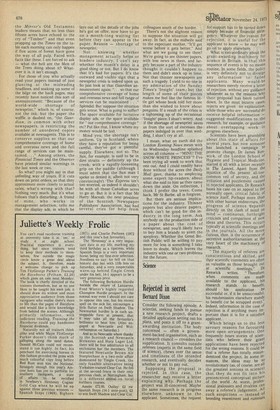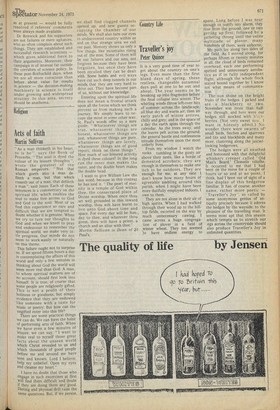Science
Rejected in secret
Bernard Dixon
Consider the following episode. A scientist, seeking funds to pursue a new research project, drafts a detailed application setting out his plans, and posts it off to a grantawarding institution. The body concerned — often a government-backed organisation, such as a research council — considers the supplication. It consults outside referees (experts in the same field of science), chews over the sense and timeliness of the intended research, and eventually decides whether or not to pay out.
Supposing the proposal is rejected. In this case, the researcher may receive a letter explaining why. Perhaps the project was ill-conceived. Maybe the same research is in progress elsewhere, unknown to the applicant. Sometimes, the request for support has to be turned down simply because of financial stringency. Whatever the reason for rejection, it is useful for the applicant to know — he may well go on to apply elsewhere.
What is extraordinary about the grant-awarding machinery fOr science in Britain, is that this sequence of events is by no means routine. In some fields, the policy is very definitely not to divulge any information to failed applicants. Many would-be researchers merely receive a letter of rejection, without any guidance whatever as to the reasons whY their proposal has been turned down. In the most bizarre cases, rejects are given no explanation. while those who are successful do receive helpful information — suggested modifications to the research, for example, or guidance about overlapping work in progress elsewhere.
Scientists have been grumbling about this state of affairs for several years, but now someone has launched a campaign to promote change. Dr James Rev wick, of the London School of
• Hygiene and Tropical Medicine, started it all with a letter recentlY in The Lancet. Apart from the injustice of the present 'all-toocommon veil of secrecy, and the irritation and puzzlement caused to rejected applicants, Dr Renwick bases his case on an appeal to the normally .open, critical fabric of science itself. Perhaps more than with other human endeavours, the progress of science -depends directly on the clash of mind on mind — continuous, forthright criticism and comparison of new ideas and theories. This occurs typically at scientific meetings and in the journals. All the more curious, then, is the occurrence of secretive authoritarianism at the very heart of the machinery of research: "The majority of referees are conscientious and skilled, and their scientific comments are often as valuable as those brought out at scientific meetings," Dr Renwick writes. "Therefore, when comments are made available to the applicant, his research stands to benefit, should his application be successful or. if it be unsuccessful. his resubmission elsewhere stand to benefit (or be scrapped even)., Indeed, information in the case or rejection is if anything more important than it is for a satisfied applicant. Which brings us to the less savoury reasons for favouring more open arrangements. One frequently hears stories of scientists who believe their grant applications have been rejected for the wrong reasons. It could be that a referee has totally misunderstood the project. In some Iry stances, the ideas may be so revolutionary (as, of course, are all the greatest notions in science) that they do not fit into his preconceived conceptual picture of the world, At worst, professional jealousies and rivalries can sway a referee's fudgement. All such suspicions — instead of breeding resentment and rumours
as at present — would be fully resolved if referees' comments were always made available.
Dr Renwick and his supporters are not failures or mere agitators, who so often complain about such things. They are established and successful research scientists — which gives additional force to their arguments. Moreover, their campaign is of interest far outside the corridors of science policy. In these post-Rothschild days, when we are all more conscious than before about value for results in science — the decision-making machinery in science is itself Under growing and widespread scrutiny. In this area, secrecy Should be anathema.
Religion



































 Previous page
Previous page